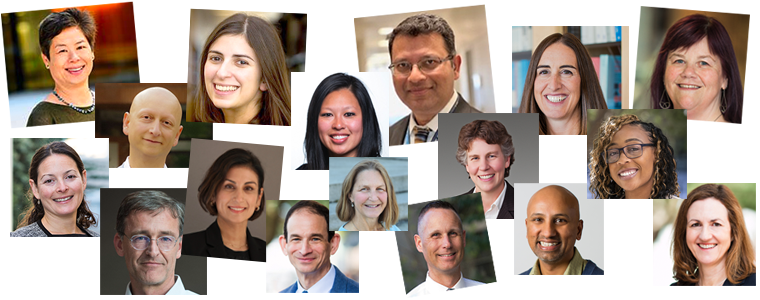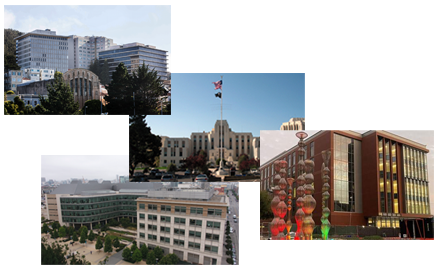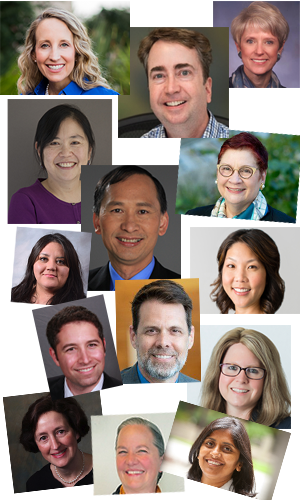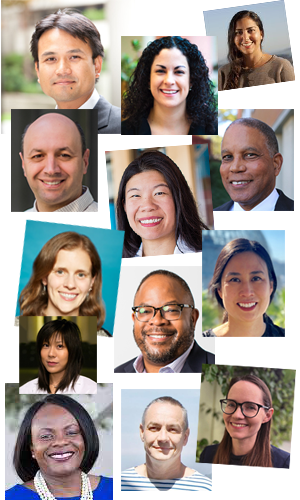Looking to 2024: Celebrating and Supporting Our People

I hope everyone had a wonderful and relaxing holiday season. I spent most of my time on the wards at Parnassus, something I’ve done for decades and always enjoy. During the holiday season (with its lighter-than-usual housestaff presence during the holiday blocks), everyone rolls up their sleeves and takes care of the patients – and each other. It’s both fun and inspiring.
As I looked back on my New Year’s columns over the past several years, I notice that I’ve discussed the impact of big issues such as Covid-19 and artificial intelligence on the DOM. This year, however, what’s front of mind is not an outside force but rather our most valued asset: our people.
Throughout 2023, academic health systems, including ours, were challenged with financial losses, staff shortages, high levels of clinician burnout, hiring freezes, and layoffs even at marquee hospitals. Compounding these issues was a post-Covid rebound in demand for healthcare services. It’s easy to see why both patients and clinicians feel like the healthcare system is failing in its most basic functions: providing access to high-quality care for patients and fostering an environment where clinicians can do their best work. In addition, on the research front, the NIH budget has not kept pace with the rising number of grant applications, leading to disheartening success rates for many investigators.
All of this provides ample room for pessimism. However, as we ring in 2024, I see many reasons for optimism. Even in the face of these considerable headwinds, our people have continued to make remarkable contributions. Below, I’ll recount just a few of the many highlights.
 At all our sites, our research enterprise has never been stronger. DOM faculty and trainees published nearly 3,500 manuscripts. Research revenue increased by 9%, with at least ten DOM principal investigators receiving awards of more than $5 million, representing all corners of the DOM – from hypertension to tuberculosis, health equity to kidney disease, aging to asthma. New facilities (such as Pride Hall at ZSFG and the Parnassus Research and Academic Building, slated to open in three years) are finally giving many of our investigators the high-quality space they need and deserve.
At all our sites, our research enterprise has never been stronger. DOM faculty and trainees published nearly 3,500 manuscripts. Research revenue increased by 9%, with at least ten DOM principal investigators receiving awards of more than $5 million, representing all corners of the DOM – from hypertension to tuberculosis, health equity to kidney disease, aging to asthma. New facilities (such as Pride Hall at ZSFG and the Parnassus Research and Academic Building, slated to open in three years) are finally giving many of our investigators the high-quality space they need and deserve.
Our educational enterprise also remains enormously strong. The Medicine clerkship continues to be the highest-rated student clerkship in the UCSF School of Medicine. One-quarter of the 2023 graduating UCSF medical school class matched into an internal medicine-based residency program. Our internal medicine residency program is ranked #3 in the nation by U.S. News and World Report. We had six DOM members inducted into the Academy of Medical Educators this past year: Sam Brondfield, Robin S. Goldman, Lisa Ochoa-Frongia, Iris M. Otani, Yalda Shahram, and Mia Williams. The DOM Program for Clinician-Educator Success (PRO-cess) continues to create programming to support the clinician-educators in our department.
Clinical volume has grown at all our sites and is projected to grow even more in 2024, particularly at UCSF Health and ZSFG. Many of our divisions ranked high in U.S. News and World Report: geriatrics #4, cancer #7, rheumatology #7, pulmonology #8, endocrinology #13, and gastroenterology #29.
 Our faculty were recipients of major outside awards:
Our faculty were recipients of major outside awards:
- Michelle Albert, Priscilla Hsue, Karla Kerlikowske, and Christian Vaisse were elected to the Association of American Physicians (AAP)
- Margaret Chesney received the Outstanding Lifetime Achievement Award from the Academy of Behavioral Medicine Research (ABMR)
- Maria Dall’Era received the Evelyn V. Hess Award from the Lupus Society of America
- Margaret Fang was named a Master in Hospital Medicine by the Society of Hospital Medicine
- Babak Javid and Elad Ziv were elected to the American Society for Clinical Investigation
- Steve Pantilat received the Award for Excellence in Education and Training from the American Academy of Hospice and Palliative Medicine
- Neil Powe received the Herbert W. Nickens Award from the Association of American Medical Colleges (AAMC)
- Dolores Shoback received the Outstanding Scholarly Physician Award from the Endocrine Society
Our people also received University-wide recognition:
- Rochelle Blanco received the Holly Smith Award for Exceptional Service to the SOM
- Malcolm John received the Chancellor Award for Public Service
- Jennifer Lai received the Distinction in Mentoring Award from the UCSF Academic Senate
- Laurae Pearson received the Chancellor Award for the Advancement of Women
- Greg Rebchook received the Chancellor Award for LGBTQ+ Leadership
- Sriram Shamasunder and Phuoc Le received the Edison T. Uno Public Service Chancellor Award for founding and developing UCSF’s HEAL Fellowship and Initiative
Several DOM faculty members have assumed UCSF or UC leadership roles:
- Harold Collard, vice chancellor for research
- Madhavi Dandu, director of the UC Global Health Institute
- Lukejohn Day, chief medical officer for UCSF Health
- Karen Hauer, vice dean for education for UCSF SOM
- Lorriana Leard, associate dean for CME for UCSF SOM
- Catherine Lucey, executive vice chancellor and provost
- Sara Murray, chief health AI officer for UCSF Health
- Tung Nguyen, associate vice chancellor for research – inclusion, diversity, equity & anti-racism
- Jen Perkins, chief medical officer for ambulatory access for UCSF Health
- Mark Pletcher, chair of the Department of Epidemiology & Biostatistics
- Ida Sim, chief research informatics officer
 Within DOM, we welcomed these new leaders:
Within DOM, we welcomed these new leaders:
- Julia Adler-Milstein, chief of the Division of Clinical Informatics and Digital Transformation (DoC-IT), our newly formed division
- Vipul Jain, chief of Medicine at UCSF Fresno
- Amandeep Shergill, chief of the Division of Gastroenterology at SFVAHCS
- Gina Solomon, chief of the Division of Occupational, Environmental, and Climate Medicine
- Phyllis Tien, chief of the Division of Infectious Diseases at SFVAHCS
In terms of diversity, these new DOM leaders bring our number of female division chiefs to 58%, up from 49% last year. Overall, more than 50% of our faculty is female, and 12% are UIM. The DOM Chair’s Council (the associate and vice chairs) is 55% female and 18% UIM. And this year’s intern class is 33% UIM.
Our staff's Gallup staff engagement grand mean went up to 4.15, an impressive increase from last year and significantly above the institutional mean. Eighty-one percent of DOM staff express their desire to remain part of DOM in the future, an increase of four percentage points since 2022. This year, we welcomed four new division managers:
- Serena Lee, manager of the Division of Occupational, Environmental, and Climate Medicine
- Serena Loya, manager of the Division of Nephrology at ZSFG
- Natalya Maisel, manager of the Division of Clinical Informatics and Digital Transformation (DoC-IT)
- Fonda Smith, manager of the Division of Experimental Medicine at ZSFG
Although these remarkable accomplishments fill me with optimism about the state of the DOM, I’d be remiss if I didn’t address our financial hurdles. The dollars are critical, because they impact our ability to support our amazing faculty, staff, and trainees.
One of the things I love most about our department is that we value each site’s work equally and do not favor any of our missions above the others. However, it is undeniable that our clinical revenue, mostly derived from UCSF Health, creates financial margins that fund our other missions and, to some extent, sites. As these clinical margins tighten due to rising costs as well as government and payer pressure to cut spending, sustaining profitability at UCSF Health gets tougher. To address this, the UCSF Health system needs to grow in order to create economies of scale, improve patient access, and enhance our negotiating position with payers.
But just growing won’t be enough – we must also increase our productivity, which is a heavy lift given high levels of burnout and suboptimal clinical systems, which reflect problems in staffing, space, and technology. Moreover, while we need our clinical revenues to support missions and academic activities across all our sites, we also must compensate our clinical faculty well in order to recruit and retain top-notch clinicians in a very expensive housing market. It’s a tricky Rubik’s Cube to solve, and much of my time, and that of other DOM leaders, goes into trying to do just that.
Appreciating this big picture is critical to understanding the myriad activities in which we’re involved, particularly at UCSF Health. In 2024, the health system will complete its acquisition of St. Mary’s Medical Center and the St. Francis Memorial Hospital in San Francisco, adding approximately 500 inpatient beds, tens of thousands of feet of ambulatory space, and around a dozen urgent care clinics to the UCSF Health system. While this is sure to be challenging, it provides a cost-effective solution to many of our capacity problems – problems that force us to turn away thousands of patients each year who could benefit from our services.
 While the purchase of the two Dignity/CommonSpirit hospitals is headline news for 2024, several other exciting developments will improve access and productivity within UCSF Health. Three major initiatives stand out: the centralization of patient intake and scheduling, taming the explosive growth of EHR inbox messages, and a digital scribe pilot program. Last year, the School of Medicine and UCSF Health agreed on a revised Funds Flow which alters how clinical dollars flow from UCSF Health to SOM departments, including the DOM. While this revised Funds Flow provides more support, it also introduces a new productivity incentive. Both the health system and UCSF are committed to becoming national leaders in the thoughtful integration of AI into our workflow, which will help productivity if executed effectively. And, if you’ve been to Parnassus lately, you may have noticed the demolition of the Langley Porter Psychiatric Institute, making way for a state-of-the-art clinical tower slated to open in 2030 at a cost of approximately $4.5 billion.
While the purchase of the two Dignity/CommonSpirit hospitals is headline news for 2024, several other exciting developments will improve access and productivity within UCSF Health. Three major initiatives stand out: the centralization of patient intake and scheduling, taming the explosive growth of EHR inbox messages, and a digital scribe pilot program. Last year, the School of Medicine and UCSF Health agreed on a revised Funds Flow which alters how clinical dollars flow from UCSF Health to SOM departments, including the DOM. While this revised Funds Flow provides more support, it also introduces a new productivity incentive. Both the health system and UCSF are committed to becoming national leaders in the thoughtful integration of AI into our workflow, which will help productivity if executed effectively. And, if you’ve been to Parnassus lately, you may have noticed the demolition of the Langley Porter Psychiatric Institute, making way for a state-of-the-art clinical tower slated to open in 2030 at a cost of approximately $4.5 billion.
Together, I’m confident that these combined efforts will increase both access and productivity, leading to more resources to support our entire DOM enterprise. Although UCSF Health faced financial challenges in 2023, this situation is much improved. This has allowed us to right-size clinic staffing and prepare for major increases in faculty and non-faculty hiring over the next several years. While the primary goal is to provide superb clinical care for more patients at UCSF Health, it’s clear that the UCSF health system must succeed in order to have flourishing academic programs at all our sites.
And these programs are flourishing. At ZSFG, I’ve been incredibly impressed by how department leadership addresses problems such as drug use and homelessness with skill, compassion, and evidence-based approaches. Our extremely busy clinical services deliver superb care to patients in an often-challenging environment, even more impressive if you consider that by October of 2023, inpatient admissions surpassed those from all of 2019 – a full return to pre-pandemic levels, and then some. Ambulatory specialty care and e-consult volume also continue to grow each year.
The SFVAHCS faces an increasingly tight budget, partly due to federal policies that now allow veterans to receive care from community (non-VA) providers. I’m awed by the exceptional care we provide to all our patients in the face of this threat. For example, the SFVAHCS Oncology program delivered specialized oncologic care to over 350 veterans living in rural areas. And in December 2023, the SFVAHCS opened a newly constructed Sleep Building, allowing for overnight sleep studies and eliminating the need to outsource this service to community providers.
While resources are critical to support out people and programs, money is not everything. I’ve seen many organizations lose sight of their core values in the headlong pursuit of profitability. Our department has never, and will never, do that. In a healthcare world and a political universe that have grown more complex and contentious, I have complete faith in our ability to deliver on all our missions and to prioritize understanding over division, collaboration over competition. We thrive when we act in unity to address the pressing problems of our time and celebrate the accomplishments of our people.
Wishing you a fabulous 2024.

Robert Wachter, MD
Chair, UCSF Department of Medicine
Holly Smith Distinguished Professor of Science and Medicine
Lynne and Marc Benioff Endowed Chair in Hospital Medicine